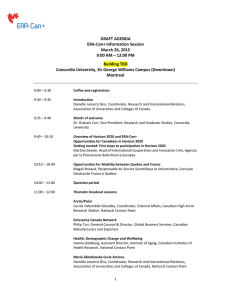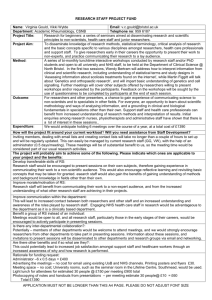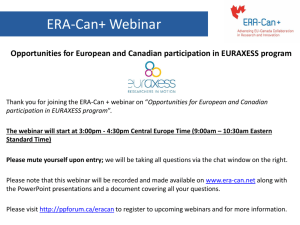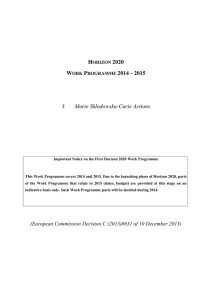Doc - Europa
advertisement
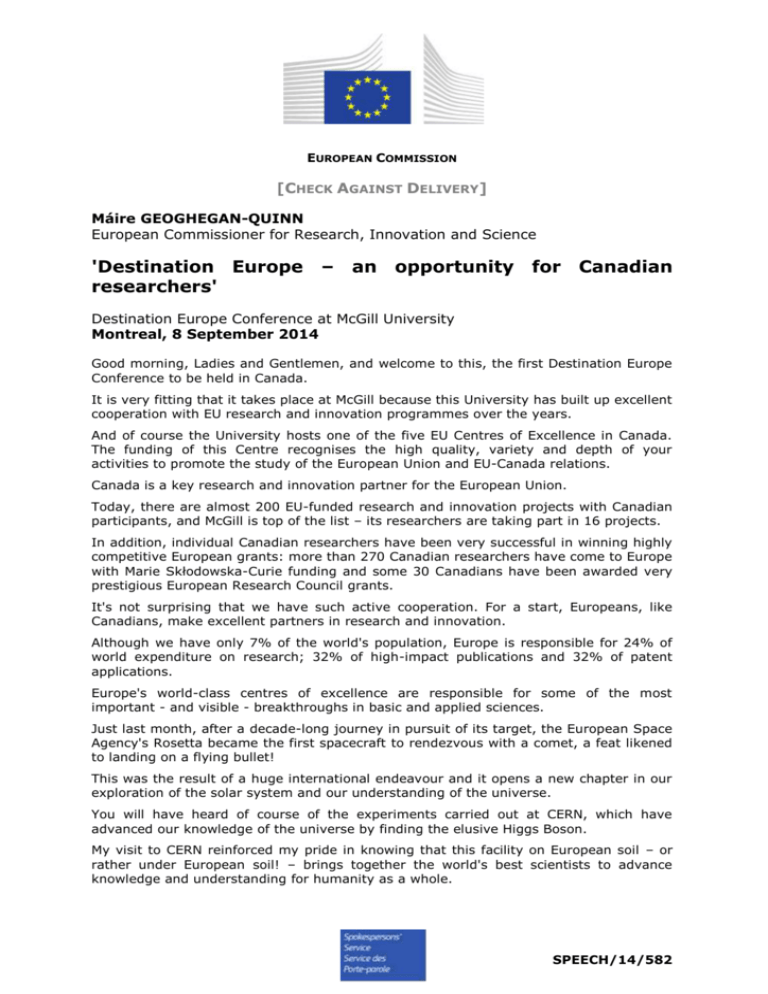
EUROPEAN COMMISSION [CHECK AGAINST DELIVERY] Máire GEOGHEGAN-QUINN European Commissioner for Research, Innovation and Science 'Destination Europe – an opportunity for Canadian researchers' Destination Europe Conference at McGill University Montreal, 8 September 2014 Good morning, Ladies and Gentlemen, and welcome to this, the first Destination Europe Conference to be held in Canada. It is very fitting that it takes place at McGill because this University has built up excellent cooperation with EU research and innovation programmes over the years. And of course the University hosts one of the five EU Centres of Excellence in Canada. The funding of this Centre recognises the high quality, variety and depth of your activities to promote the study of the European Union and EU-Canada relations. Canada is a key research and innovation partner for the European Union. Today, there are almost 200 EU-funded research and innovation projects with Canadian participants, and McGill is top of the list – its researchers are taking part in 16 projects. In addition, individual Canadian researchers have been very successful in winning highly competitive European grants: more than 270 Canadian researchers have come to Europe with Marie Skłodowska-Curie funding and some 30 Canadians have been awarded very prestigious European Research Council grants. It's not surprising that we have such active cooperation. For a start, Europeans, like Canadians, make excellent partners in research and innovation. Although we have only 7% of the world's population, Europe is responsible for 24% of world expenditure on research; 32% of high-impact publications and 32% of patent applications. Europe's world-class centres of excellence are responsible for some of the most important - and visible - breakthroughs in basic and applied sciences. Just last month, after a decade-long journey in pursuit of its target, the European Space Agency's Rosetta became the first spacecraft to rendezvous with a comet, a feat likened to landing on a flying bullet! This was the result of a huge international endeavour and it opens a new chapter in our exploration of the solar system and our understanding of the universe. You will have heard of course of the experiments carried out at CERN, which have advanced our knowledge of the universe by finding the elusive Higgs Boson. My visit to CERN reinforced my pride in knowing that this facility on European soil – or rather under European soil! – brings together the world's best scientists to advance knowledge and understanding for humanity as a whole. SPEECH/14/582 That might sound just a little bit evangelical! – but I am absolutely passionate about the opportunities for researchers in Europe and I'm determined to ensure that colleagues from around the world, Canada included, join us in Europe. The Max Planck Institute of Germany, the Gulbenkian Institute in Portugal, the CNRS in France, or the Karolinska Institute in Sweden are just a few more examples of the European centres of excellence that are waiting for you. And of course there are worldrenowned universities such as Oxford and Cambridge in the UK. In the private sector, industry in Europe continues to invest in science, technology and innovation. EU-based enterprises continue to rely on R&D for their competitive edge. In 2012 an EU company, the German carmaker Volkswagen, was the world's largest private sector Research and Development investor, with an investment of 9.5 billion Euro. Overall EU based firms stepped up Research and Development investment by 6.3%. CERN and Rosetta certainly hit the headlines around the world, but the news from Europe over the last few years has often focused on the economic downturn. I am here to tell you that signs of recovery in Europe are starting to show, and I am convinced that research and innovation will be at the heart of a lasting recovery. I’m certainly not alone in that conviction. Last October the leaders of the EU's 28 Member States reaffirmed that 'Investment in research and innovation fuels productivity and growth and is key for job creation'. That might sound like stating the obvious, but in my book, it's a message that can't be repeated too often. It also serves as a statement of our intent in Europe. So, even when public budgets are tight, many European countries are protecting investment in research. In fact, the EU has agreed a target for research and innovation spending of 3% of GDP by 2020. This investment means opportunities not only for European researchers, but also for researchers anywhere in the world who are interested in working in Europe or with European partners. Horizon 2020, launched last December, is the European Union's response to the need to invest in our economy through Research and Innovation. This seven-year funding programme provides huge opportunities for researchers and innovators to collaborate across Europe and indeed with the rest of the world. Its total budget is nearly 80 billion Euro, or around 120 billion Canadian Dollars While the EU's overall budget for the next seven years has been cut, Horizon 2020 represents a decisive shift towards research and innovation – with Horizon 2020 seeing a 30% real terms increase in finance over the previous programme. Horizon 2020 is a new type of research programme for the EU. It has been designed from the outset to deliver results that make a difference in people's lives. It offers support at every step of the journey from excellent fundamental research to innovative products and services. It takes a challenge-based approach. This is because the problems that Europe faces whether food and energy security, clean transport, public health or climate change – cannot be solved by a single field of science or technology, let alone by a single country, or in most cases, by Europe alone. Complex challenges need solutions that draw upon many different areas of research and innovation and that’s why interdisciplinarity is such a crucial aspect of Horizon 2020. 2 It is also one of the reasons why we are highlighting international cooperation – Horizon 2020 welcomes participants from across the globe in its research and innovation projects. Furthermore, and with particular relevance for this audience, individual researchers from anywhere in the world can apply for the prestigious European Research Council grants and for the Marie Skłodowska-Curie actions on researcher training, mobility and careers. In this morning's event you will hear from these two major pan-European initiatives designed to promote excellence, competition, mobility and innovation: The European Research Council funds researchers from anywhere in the world to establish their own research teams and carry out top-class research in Europe. Over 30 ERC-funded Canadians are currently working in Europe. They have established their teams in prestigious institutions like the University of Oxford, the Max Planck Society and the Institute Pasteur. The Marie Skłodowska-Curie Actions offer huge opportunities to early stage researchers, from doing a PhD within an Initial Training Network, to individual fellowships for PostDocs. During the Seventh EU Framework Programme, that ended last year, the Marie Skłodowska-Curie scheme funded some 270 Canadian researchers to work in Europe and more than 150 Europeans to work in Canada. We hope that this excellent level of researcher mobility will increase in the coming years. These pan-European programmes are only the tip of the iceberg of opportunities. EU Member States also offer generous grants and fellowship programmes open to researchers from anywhere in the world. However, Europe's attractiveness is not just based on our excellent research capabilities, infrastructure or the funding opportunities you will hear about this morning. It is also due to our deep and diverse arts and culture, our beautiful landscapes, our vibrant cities, our varied cuisine and many other features of a fulfilling life. Of course there is little point in having so many opportunities available for researchers from around the world if they are not aware of them. This is why I launched the Destination Europe initiative two and a half years ago. Together with the EU's Member States we believe that it is essential to promote Europe's vibrant and forward-looking research and innovation culture and to raise awareness internationally of the many excellent career and funding opportunities in European industry, universities and research organisations. Through Destination Europe events we have been providing information to researchers considering a career move to Europe – whether for a few months or a few years. But we recognise, too, that it is not enough to come and present these opportunities once or twice a year. You need easy and continuous access to information about the opportunities. This is why we have created EURAXESS – with a free jobs portal featuring thousands of vacancies in Europe each day, in a vast array of research fields. If you decide to move to - if you are European, move back to - Europe, you may also need help on practical issues. EURAXESS Service Centres in 40 European countries can provide information on everything from visas to child care. 3 Here in North America, the dedicated EURAXESS-Links North America network was established a few years ago and I encourage all of you to join it so you can stay informed of policy developments and career and funding opportunities in Europe. On the issue of visas – I would like to mention that most EU countries have ratified the scientific visa package, to facilitate the procedures for admitting researchers from outside Europe. In order to succeed, Europe has to continuously stimulate research and innovation and to capitalise on its brightest and most innovative ideas. Our success will depend, in part, on our ability to attract talent to complement and catalyse the skills and knowledge we already have. Europe is serious in its ambition to compete for the best talent worldwide. I hope that this conference will inspire many of you to make Europe the next destination on your career path. Whether you are from Canada, Africa, Asia, or elsewhere, whether you are a Doctoral Student, a Post-Doc or an established researcher; Europe has something to offer you. Come and join us! Thank you. 4

